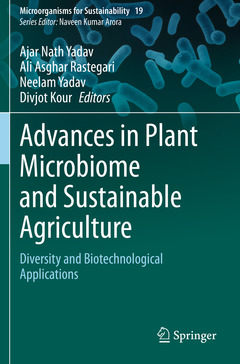Description
Advances in Plant Microbiome and Sustainable Agriculture, 1st ed. 2020
Diversity and Biotechnological Applications
Microorganisms for Sustainability Series, Vol. 19
Language: English
Subjects for Advances in Plant Microbiome and Sustainable Agriculture:
Publication date: 08-2021
296 p. · 15.5x23.5 cm · Paperback
Publication date: 08-2020
Support: Print on demand
Description
/li>Contents
/li>Biography
/li>Comment
/li>
Dr. Ajar Nath Yadav is an Assistant Professor at the Department of Biotechnology, Eternal University, Baru Sahib, Himachal Pradesh, India. He has extensive teaching and research experience. He holds a doctorate degree in Microbial Biotechnology from the Indian Agricultural Research Institute, New Delhi and Birla Institute of Technology, Mesra, Ranchi, India,. Dr. Yadav has published 133 highly cited papers and has received 12 best paper presentation awards as well as an outstanding teacher award in 2018. He is a life member of the Association of Microbiologists in India, Indian Science Congress Council and National Academy of Sciences, India.




